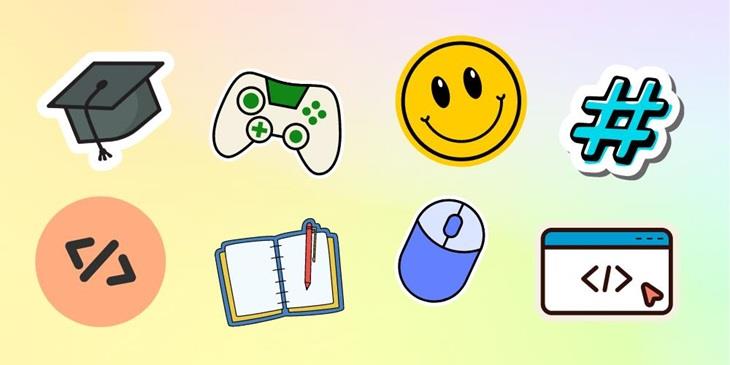
Want to be the creator of new ITU stickers
The Communication Department are looking for sticker designs to use when promoting ITU to high school students and other interested individuals. We invite all students interested in design to enroll in this competition to become the name behind a sheet of up to four ITU stickers that will be handed out throughout the spring semester 2024 around schools, fairs, etc.
Written February 16, 2024 by Stephanie Gullestrup Rode
To take part in the competition, please read the information and requirements below before designing your contribution. You can send your final design(s) or any questions about the competition to Communication Advisor Stephanie Rode (srod@itu.dk).
Purpose of the stickers
ITU offers various outreach activities for Danish high school students and others that are curious about our university. Different types of merchandize serve as a way of giving participants something to remember us by and spreading awareness about ITU to others. By adding stickers to our options, we hope to see interested individuals putting them on their laptops and other personal items – either because they are interested in our university or simply just because the stickers look cool or have a bold expression.
Design requirements
Please make sure that your sticker sheet creation lives up to the following design specifications:
• The sheet should be 105 x 150 mm (postcard size) and include up to 4 stickers.
• The sheet can be designed in portrait or landscape format.
• The sheet will be printed as kiss cut stickers meaning that the full sheet (incl. background) should be included in the design.
• The Danish version of the ITU logo should be included somewhere on the sheet (not necessarily on a sticker). Please download the logo via https://www.itu.dk/Om-ITU/Presse/Logoer
• All stickers should contain symbols, logos, or other elements that relate to ITU or IT subjects in general. We encourage you to use creative statements on all or some of your stickers and have created a list of examples that can be used or spark inspiration. Please find the list at the bottom of this page.
• The final file should have a resolution of 300 DPI.
• The final file should be editable for ITU’s graphic designer to adjust details before ordering the stickers from an external supplier.
• The sheet should have space around the individual stickers to enable cutting lines.
• The final contribution should be handed in to the Communication Department digitally. Please send your design via email to srod@itu.dk. You may hand in more than one design if you wish.
The winner is…
ITU’s Communication Department will choose the winner based on creativity as well as suitability with their purpose and the specifications. The winner’s name will be featured (if they wish) on the final sheet, and they will also receive an ITU merch goodie bag incl. a batch of sticker sheets for personal use.
The Communication Department reserve the right to edit the final designs, to choose more than one winner, or to not use the contributions at all if they do not live up to the specifications above.
Deadline for sending through one or several designs is Friday, 1 March 2024.
Examples of sticker statements